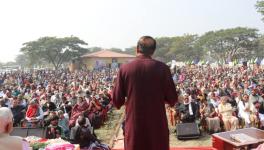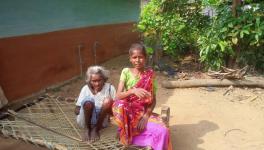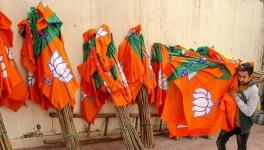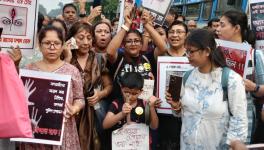Bengal Paddy Procurement: Farmers, Pattadars Face Uphill Task
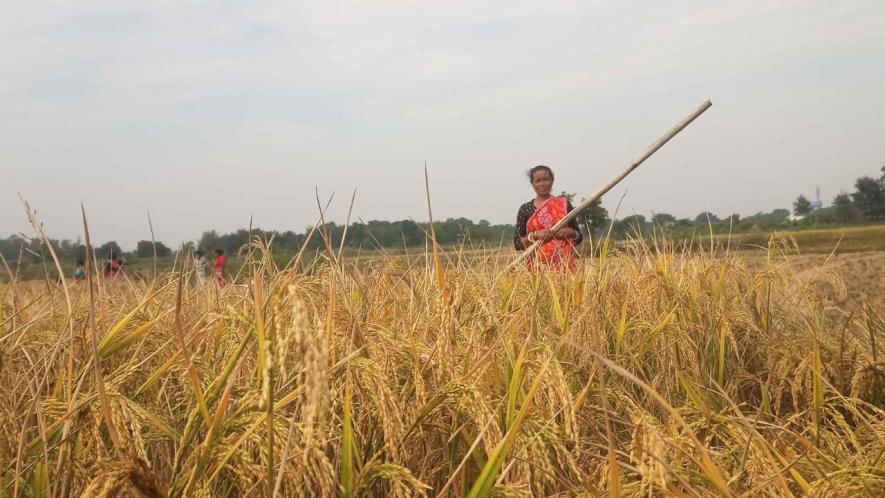
Sharecropper Amita Lohar at Sanabandh village in Bankura district.
After harvesting, sharecroppers, registered bargadars, and pattadars have no direct right to sell paddy at the government's paddy procurement camps in West Bengal. According to government regulations, only farmers registered under the Krishak Bandhu scheme (government-recognised farmers) are permitted to sell paddy in these camps. To qualify, farmers must possess valid land records. Sharecroppers, however, typically do not have land registered in their names.
While government guidelines state that a sharecropper can sell paddy if the Block Development Officer (BDO) concerned certifies them as a farmer, obtaining this certification involves navigating multiple administrative hurdles. Additionally, the next generation of pattadars—those holding permanent land settlement rights—faces challenges as many lack updated land records in their names.
This issue stems from historical factors, such as the passing away of individuals who originally received pattas during the Left Front government era, subsequent family divisions, and the reluctance of the current Trinamool Congress-led administration to update land records for inherited patta lands.
Notably, 60% of the current agricultural output in Bengal is cultivated by sharecroppers and pattadars. Due to their inability to access government procurement camps, these farmers are often compelled to sell paddy at lower prices to middlemen. Furthermore, complications in the procurement process discourage even some registered farmers under the Krishak Bandhu scheme from selling their produce at government camps.
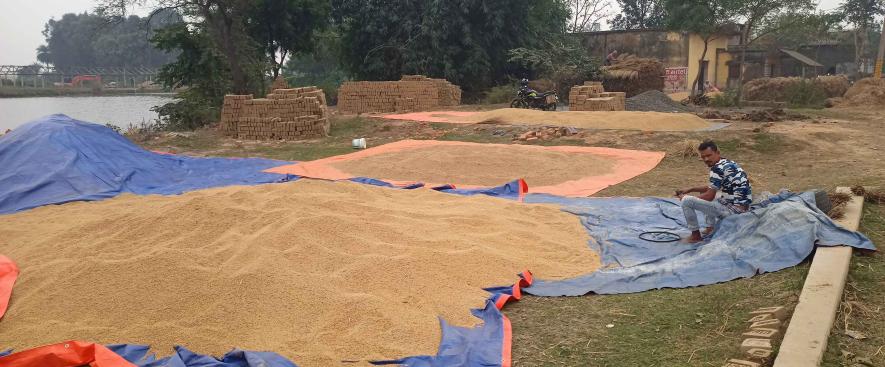
Farmer Najibul Mandal waiting to send paddy to a middleman's shop.
As a result, the state government failed to meet its paddy procurement target last year. This year, the Food Department of the Bengal government has been forced to reduce its procurement target.
Situation of Paddy Procurement in Govt Camps
The Food Department of West Bengal commenced paddy procurement from farmers this month. To review the procurement status, two state-level meetings were held last month. On November 19, the Principal Secretary of the State Food and Supplies Department, Parvez Siddiqui, conducted a meeting with district officials. During this meeting, the reluctance of farmers to register for selling paddy in government procurement camps was highlighted. Despite the ongoing paddy harvesting season, districts like Bankura, Purulia, and Purbo and Paschim Bardhaman reported alarmingly low numbers of registered farmers. Officials were instructed to expedite the enrolment process.
However, no significant progress was observed even 10 days after this meeting. Consequently, on November 29, Chief Secretary Manoj Pant convened a high-level meeting with all the officials concerned to address the paddy procurement issue. State Food and Supplies Minister Rathin Ghosh was also present. In this meeting, detailed discussions were held on farmers' reluctance to register their names for selling paddy at government camps.
The following day, on November 30, the Principal Secretary issued a directive (Memo No. 292/Pr.secy/F&S/2024) to all District Magistrates, reporting the poor registration numbers of farmers for paddy procurement. The directive emphasised that the number of registered farmers was negligible compared with those enrolled under the Krishak Bandhu scheme. District officials were instructed to address this issue promptly and ensure the registration of farmers on the Food and Supplies Department portal.
Why is Govt Concerned Over Paddy Procurement?
The government’s concern stems from last year’s shortfall in paddy procurement. While the state government had targeted the registration of 25 lakh farmers, only 17 lakh were registered. Even more concerning was that only 1.37 lakh farmers ultimately sold paddy to government camps at the Minimum Support Price (MSP), with the majority of registered farmers showing no interest.
According to the Agriculture Department, 1.08 crore farmers are covered under the Krishak Bandhu scheme in West Bengal. Farmers under this scheme are eligible to sell their paddy in government camps, with a maximum cap of 25 quintals per farmer at a price of ₹2,320 per quintal, the same rate offered last year. Despite this, the state government procured 26% less paddy than its target of 70 lakh tonnes last year.
After harvesting, land labourer-cum-sharecroppers Lalti Lohar and Mala Bagdi eating food in the fields at Sanabandh village.
This year, the procurement target has been reduced to 68 lakh tonnes. However, the current registration figures for farmers remain unsatisfactory, raising concerns about achieving even this reduced target.
Farmers Reluctant Despite Krishak Bandhu Enrolment
A significant portion of farmers in West Bengal, despite being enrolled in the Krishak Bandhu scheme, are unwilling to sell paddy in government procurement camps. Various issues contribute to this reluctance. According to Akhil Ghose and Dipankar Hazra of Golsi village of Purbo Bardhaman district, Subash Ghose of Kamargore village under Sonamukhi Block of Bankura District, Dilip Ghose of Pubramadanpur village under Pashchim Bardhaman, Susanta Haldar of Garbeta under Pashchim Medinipur, reaching the procurement camps, which are often centrally located in block areas, poses a tremendous challenge for farmers from remote villages. Additionally, many farmers remain unaware of the name registration portal due to the absence of government-led awareness campaigns.
Even those who manage to register and visit the camps often face operational inefficiencies. Farmers report insufficient staff at procurement centres and frequent malfunctions of weighing machines, resulting in delays. For instance, farmers often have to return home with their paddy due to these issues.
Furthermore, the government imposes a maximum procurement limit of 25 quintals per farmer, leaving those who produce more, such as farmers cultivating over four bighas, to sell the excess in the open market. If one bigha land is cultivated, the yield is 6-7 quintals of paddy.
Private Players at Procurement Camps
Farmers, including Mohammad Selim of Khosbag, Asim Das of Sahospur in Bankura, and Rathin Mahato of Borabazar village in Purulia, allege interference by private rice mill owners and local ruling party (TMC) activists at procurement camps. These private representatives weigh paddy on behalf of the government. They deduct 7-8 kilogrammes per quintal, citing high moisture content. As a result, farmers see little difference in the prices offered at government camps and open markets, discouraging them further from participating in the government system.
High Cultivation Costs, Exploitation by Middlemen
Farmers such as Nitai Ghose of Kamargore and Satyoranjan Das of Sonamukhi Block in Bankura highlight the rising costs of cultivation. Fertilisers and pesticides are not readily available through cooperative societies and must be procured at inflated prices in the black market. Despite repeated appeals to the Agriculture Department and local authorities, no action has been taken to address these issues.
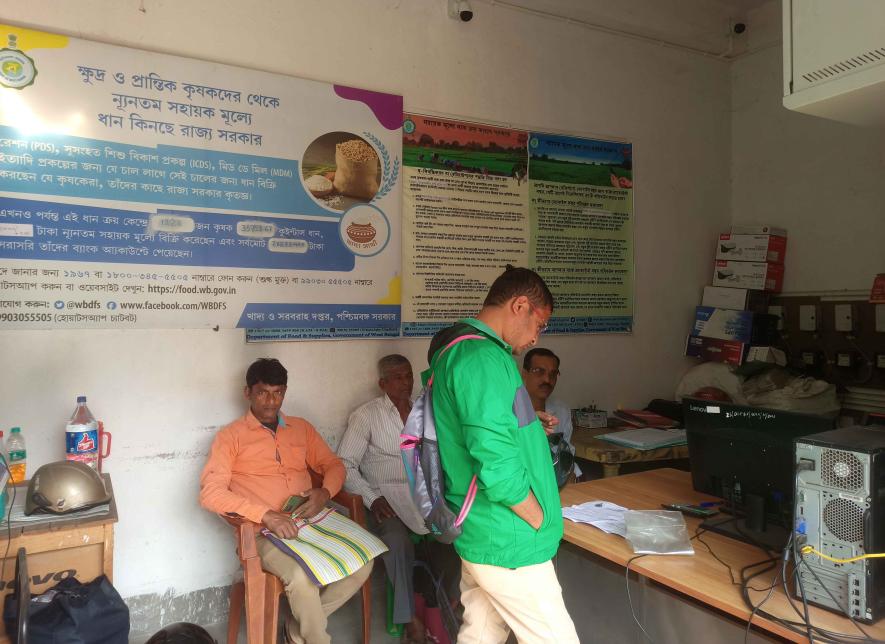
A government paddy procurement centre in Bankura district.
With cooperative banks nearly ceasing to provide loans, farmers are forced to rely on microfinance institutions with high interest rates or local aarotdars (middlemen), who provide funds but at the cost of low selling prices. Currently, farmers in West Bengal sell paddy to local middlemen at ₹1,800-1,900 per quintal, a rate that has remained unchanged despite a sharp increase in cultivation costs.
Comparisons With Other States, Insurance Issues
“Farmers question the disparity in MSP across states. While Kerala offers ₹2,800 per quintal, Bengal’s MSP remains at ₹2,320. Additionally, many farmers affected by natural disasters are unable to claim compensation under the Bangla Shasya Bima scheme, allegedly due to political interference and bureaucratic delays. This year, the aftermath of cyclone ‘Dana’ has further reduced the paddy yield, worsening the situation”, Amal Haldar, Sarabharat Krishak Sava Poshchim Banga state committee secretary, told this writer. He said, “We have demanded from the organisation to increase MSP and get crops insurance properly to all affected farmers.”
Plight of Sharecroppers and Pattadars
Sharecroppers are in an even worse position. According to Rabi Lohar of Sanabandh village in Bankura, many landowners now verbally lease their land to sharecroppers for ₹1,000 per bigha, leaving sharecroppers to bear the entire cost of cultivation. As they are not covered under the Krishak Bandhu scheme, sharecroppers cannot sell their paddy at MSP in government camps or claim compensation during natural disasters.
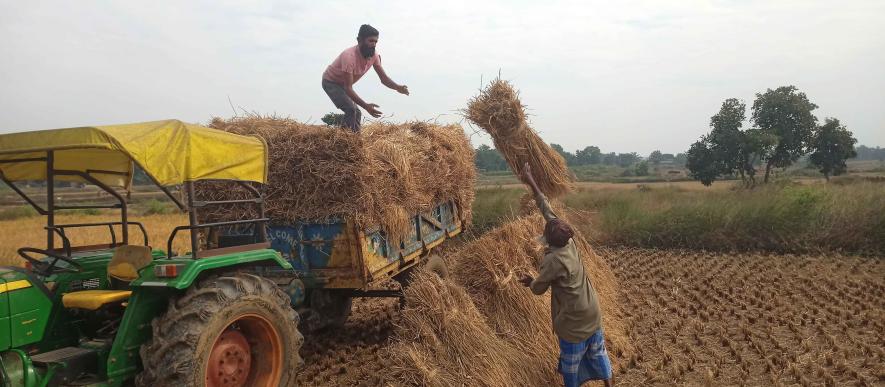
Mainul Midya and Jallul Midya, pattadars of Badulara village, Bankura, taking paddy home on a tractor after harvesting.
Pattadars face similar difficulties. Mainul Midya of Badulara village explained to this writer that although his father received a patta in 1980, the land records have not been updated in his name, excluding him from Krishak Bandhu benefits.
Lack of Administrative Support
Bankura District Agriculture Officer Deb Kumar Basu told this writer that a certificate from the BDO is required for sharecroppers to sell paddy at government camps. However, farmers claim that obtaining this certification involves navigating complex bureaucratic processes. Moreover, they allege that Agriculture Department staff rarely visit the fields or provide necessary support. As a result, many farmers are forced to sell their produce to middlemen at lower rates, underscoring the urgent need for systemic reforms in West Bengal’s paddy procurement process.
The writer covers the Jangalmahal region for ‘Ganashakti’ newspaper in West Bengal. The views are personal.
(All pictures by Madhu Sudan Chatterjee)
Get the latest reports & analysis with people's perspective on Protests, movements & deep analytical videos, discussions of the current affairs in your Telegram app. Subscribe to NewsClick's Telegram channel & get Real-Time updates on stories, as they get published on our website.









